ASX flat as economy roars back, with GDP growth up 3.3%
ASX flat even as RBA says economy has ‘turned the corner’ and GDP grows 3.3% to take Australia out of technical recession.
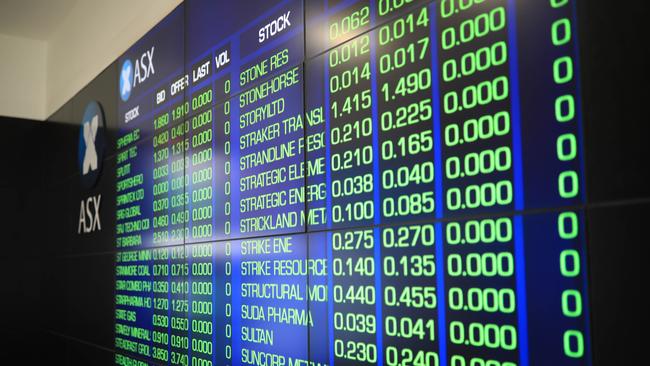
Welcome to the Trading Day blog for Wednesday, December 2. Australian closed flat after starting well then sinking around lunch. The local market’s performance came despite more rises on Wall Street, where the S&P 500 (up 1.1 per cent) and Nasdaq (up 1.3 per cent) hit new records. The Dow rose 0.6 per cent. Locally, GDP figures showed Australia had emerged from a technical recession with faster than expected 3.3pc growth in the September quarter. RBA Governor Philip Lowe told a House economics committee the economy had “turned a corner”.
Glynis Traill-Nash 6.26pm: Zimmermann sells stake
Australian fashion label Zimmermann has sold an undisclosed stake of the business to Italian private equity fund Style Capital.
The next phase of growth for the company will focus on Asia and Europe.
In 2016, the 29-year-old brand sold a minority stake in the company to US growth equity firm General Atlantic, which it is understood to have sold to Style Capital.
Co-founders Nicky and Simone Zimmermann are said to be staying on as part of the new deal.
In a statement, Nicky Zimmermann said: “We are excited to partner with the team at Style Capital as we continue on our journey to build a unique global luxury brand from Australia. For Simone and I, Zimmermann has taken us to places that we never thought possible when we started.
“We are so excited by what lies ahead and look forward to working collaboratively with our new partners.”
Read more: Zimmermann sells stake to Italy’s Style Capital private equity
Lisa Allen 6.21pm: Sirius unveils luxury overhaul
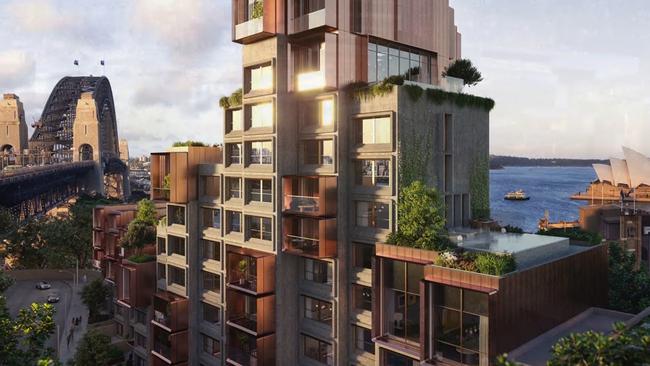
Half a decade after the NSW government made the controversial decision to sell Sydney Harbour’s Sirius building, relocating its public housing tenants to the city’s suburbs in the process, its new owner has finally lodged plans for an ultra-luxury revamp at the hands of world-acclaimed designers.
Positioned at the foot of the Harbour Bridge and overlooking Circular Quay and the Opera House, developer JDH Capital, controlled by former Macquarie Bank executive Jean-Dominque Huynh, plans 76 apartments.
Mr Huynh bought the building designed in the brutalist style for $150m in the middle of last year after the state government pitted several private sector developers against each other in a tightly fought contest.
On offer in the former public housing block would be one, two, three and four-bedroom apartments, with some penthouses replete with private swimming pools.
Interiors were designed by architecture firm BVN and leading British interior designer Kelly Hoppen.
Read more: Ultra-luxury Sirius development on Sydney Harbour underway at last
16.34: ASX flat despite GDP leap
The local sharemarket remained mostly flat on Wednesday despite Australia technically moving out of a recession, with a boosted bond yield and depressed US futures keeping the market subdued.
The benchmark S&P/ASX 200 Index closed up 1.6 points, or just 0.02 per cent after initially reaching intraday high of 6616 in the morning before falling some 50 points and then staging a gradual recovery.
News that Australia is no longer in recession after seeing 3.3 per cent growth in September boosted the 10 year government bond by 66 basis points to a 0.98 per cent yield while the Australian dollar climbed steadily higher to $US0.737 cents.
The tech index was the largest drag on the market, down 0.92 per cent as Wisetech Global fell 3.5 per cent, Appen fell 4.08 per cent, Nearmap 5.98 per cent and Zip co 1.33 per cent, despite a trading update indicating strong customer growth.
The materials and industrial indexes recorded growth, up 1.16 per cent and 0.65 per cent as National Accounts data showed new dwellings investment rose for the first time since June 2018.
As a result, GWA lifted 3.74 per cent, Cleanaway Waste Management was up 4.56 per cent while NRW Holdings was up 5.54 per cent.
But the best performer was Sandfire Resources, recording a second strong trading day, lifting 12.27 per cent as the copper spot price remained near seven year highs on the London Metals Exchange.
Mesoblast was the second-best performer, lifting 7.26 per cent, while gold miners made a comeback as the gold spot price hovered above US$1800, boosting Westgold Resources by 6.69 per cent and Perseus Mining by 3.88 per cent.
Bridget Carter 4.16pm: Vaughan Strawbridge leaving Deloitte
Deloitte partner Vaughan Strawbridge is departing the accounting firm to join FTI Consulting.
More to come.
Bridget Carter 4.01pm: Regis considers property spinoff
DataRoom | Speculation is mounting that Regis Healthcare may be weighing a plan to follow in the footsteps of other takeover targets and spin off its real estate platform as part of a defensive play.
It comes after Regis last month told the market that it had received a $556m takeover proposal from Washington H. Soul Pattinson in a scheme of arrangement structure that it later rejected.
While there is talk that Soul Patts will return to the negotiating table with a higher offer, the understanding is that Regis is exploring options behind the scenes to fend off suitors.
More to come.
2.50pm: Australian Unity finishes bookbuild early
Australian Unity has completed a mutual capital instrument bookbuild earlier than expected after strong demand from institutional investors and syndicate brokers.
Approximately $105m has been allocated on a firm basis to these investors, an increase on the original $100m desired.
A dividend rate of 5 per cent per annum, or 7.14 per cent grossed up for franking credits has been declared.
The offer is now expected to open earlier than the original date of December 7.
2.35pm: ASX near flat, Mesoblast jumps again
The local sharemarket remained close to flat in early afternoon trade, down about 0.05 per cent, as GDP figures confirmed Australia is now technically out of recession.
Shortly after 2.30pm (AEDT) the ASX200 was trading at 6585 points, down just three points on the open. It had started well but slipped into the red over lunch.
Materials and industrials indexes staged a recovery to grow 0.99 and 0.41 per cent respectively following news dwellings investment rose for the first time since June 2018.
All other indexes were in the red, with the tech index down 1.17 per cent as Technology One fell 2.16 per cent, Wisetech fell 2.88 per cent and Nearmap fell 3.85 per cent.
Sandfire Resources extended its gain, lifting 12.06 per cent amid enthusiasm over seven-year copper highs and the company’s new mine in Botswana.
Mesoblast was up 7.51 per cent after it unveiled US FDA fast-track approval for its treatment for the respiratory symptoms of COVID-19, while NRW Holdings was up 6.28 per cent.
Treasury Wine Estates extended its recovery, up a further 2 per cent to 4.35 per cent growth, as did Lynas Rare Earths, which lifted 4.30 per cent after underperforming in the morning.
2.15pm: Westpac to sell insurance unit
Westpac Banking Corp. has agreed to sell its general insurance business to Allianz SE for $725 million.
Australia’s second-largest bank by market capitalisation on Wednesday said the sale price represents a multiple of 1.3x the unit’s fiscal 2020 gross written premium. The sale will add about 12 basis points to its common equity Tier 1 capital ratio, the lender said.
Westpac said it will enter into an exclusive 20-year agreement to distribute Allianz products to bank customers. The transaction includes contingent payments subject to integration milestones and business performance over the next five years, as well as ongoing payments relating to the distribution agreement.
Westpac has distributed Allianz products including auto and travel insurance since 2015.
“This transaction is another step in simplifying our business,” Westpac Chief Executive Peter King said.
Westpac earlier this year prepared the business for divestment by separating it into a new specialist businesses division along with its superannuation operations and wealth platforms.
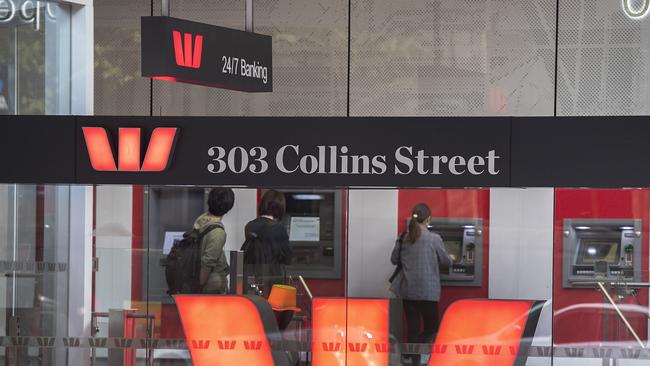
Dow Jones Newswires
1.25pm: Monash beats the benchmark
The $68m listed long-short fund Monash Absolute Investment Company has delivered gains of 15.8 per cent for the month of November - outperforming the benchmark S&P/ASX 200 which was up 10.2 per cent over the month.
Calendar year to date the Monash fund has delivered 26.3 per cent.
Monash noted markets were boosted after a successful vaccine trial was announced, leading to a pronounced rotation to value stocks and “COVID-19 losers” such as travel businesses.
For Monash the largest contributor was Telix which rose after announcing sales contracts.
The next biggest contributor was retailer Lovisa, which announced a large European expansion.
Third was Webjet part of Monash’s “travel group” trade, which rose on the re-opening of domestic Australian travel.
Bridget Carter 12.55pm: AMP shelves real estate sale plans
AMP is understood to have shelved the sale process for its real estate operations within its AMP Capital business, say sources.
It is understood that parties that were interested in participating in a process were advised on Friday that the plan was no longer on the table by the Australian listed financial group.
Understood to be interested in the real estate were Charter Hall, Dexus Property Group, Lendlease, Vicinity Centres and the GPT Group.
The real estate arm consists of high-profile properties such as Sydney’s Quay Quarter office and retail complex at Circular Quay and the shopping malls Macquarie Centre in Sydney’s north and Pacific Fair on the Gold Coast - all worth billions of dollars.
AMP’s advisers, Goldman Sachs and Credit Suisse, were understood to have shortlisted parties after the contest had moved into the second stage.
However, the process was believed to be complex.
It is understood that a number of parties were refusing to sign confidentiality agreements and had stopped working on a potential acquisition of the Australian real estate portfolio held within AMP’s investment arm.
It is also understood around the market that parties interested in the assets were being asked to adhere to conditions that prevented discussions with AMP Capital real estate investors.
A standstill arrangement should a party emerge with an offer for the entire company was also said to be a condition, according to sources.
Some have speculated that the reason that the real estate process has been shelved is due to progress being made with private equity firm Ares Management, which has been in talks to buy the $6bn-odd wealth manager.
12.21pm: ASX sinks into the red at midday
National accounts figures showing the economy grew 3.3 per cent in the September quarter failed to impress the local sharemarket, which sank 0.21 per cent at lunch to an intraday low of 6574.6 points.
Dragging the market down was the real estate sector index, down 1.07 per cent, while the energy index continued to languish amid the failure of OPEC+ to make a decision on oil production cut extensions, remaining down 0.86 per cent.
All other sector indexes slipped into the red with the exception of materials, which was up 0.63 per cent as copper miner Sandfire Minerals continued to overperform.
Mesoblast was up 5.81 per cent with the market still reacting positively to the news that the US FDA had granted its hallmark treatment for the respiratory symptoms of COVID-19 the right to accelerated approval.
The gold miners were lifted as the gold price managed to remain above $US1800/oz, with Westgold Resources up 4.81 per cent and St Barbara up 3.78 per cent.
Cleanaway Waste Management was up 3.32 per cent while Treasury Wine Estates saw something of a “dead cat bounce,” lifting 3.10 per cent after falling by nearly 20 per cent since last Friday, when China announced it would tax Australian wine imports.
Financial services technology developer Bravura Solutions was the most prominent underperformer, down 3.18 per cent, followed by Worley down 3.0 per cent.
National Storage REIT was down 2.05 per cent while Domino’s fell off its perch after a good run yesterday, down 2.03 per cent despite upgrades from UBS and Morgans.
The good economic data seemed to boost the Australian dollar, which was trading up slightly at $US73.79 cents.
Patrick Commins 12.13pm: Lowe quizzed on OECD warning
RBA boss Philip Lowe has been asked whether he agreed with the overnight OECD report warning policymakers around the world to not withdraw stimulus before the recovery is entrenched.
The context is the RBA forecast that the jobless rate will still be at 6 per cent in two years’ time - an “unsatisfactory” outcome, but one that Lowe says is “not too bad” set against the worst global downturn in a century.
“The level of fiscal support is obviously an influence” on the economy, but Dr Lowe says “at some point fiscal stimulus will have to be tailed back”.
He says it “makes sense” to have collective government - federal and state - deficits running at 15 per cent of GDP, but “does it makes sense to have budget deficits collectively at 15 per cent the following and the year after that? Probably not.”
“I’m hoping next year the number (the deficits) will be smaller. We don’t need to keep the wage subsidies going forever through the JobKeeper program, we need to tail this back eventually - so it’s getting the right balance”.
12.11pm: Nickel Mines raising $364m
Nickel Mines will undertake a $364m fully underwritten raising to fund an initial 30 per cent interest in the Angel Nickel Project, a partly constructed nickel production plant in Indonesia owned by business partner Shanghai Decent Investment.
The offer comprises an accelerated institutional entitlement offer and a retail entitlement offer and is priced at $0.94 cents per new share, a 10 per cent discount to the last trading price of $1.045.
386.9m ordinary shares will be created, representing 18.2 per cent of existing shares on issue.
Nickel Mines has a binding agreement to acquire 70 per cent of the Angel Nickel Project by 31 December 2021 at a total cost of $US490m ($664.0m).
Adam Creighton 11.30am: GDP up 3.3pc in September quarter
New figures show the Australian economy grew 3.3 per cent by in the September quarter, more than many had expected, to confirm the country roared out of technical recession over the three months.
The 3.3 per cent growth over the three months to the end of September was better than the 2.5 per cent most economists had expected, and partly reversed the 7 per cent drop in the second quarter.
“Australia experienced a partial recovery in the September quarter. As a result, economic activity fell 3.8 per cent through the year to September quarter,” said the ABS’s head of National Accounts Michael Smedes.
The improvement signals the end of “recession”, which is informally defined as two consecutive quarters of economic contraction.
Household spending, which plunged almost 13 per cent in the second quarter, rose almost 8 per cent, driven by spending on hotels, restaurants and cafes, which began to resume more normal trading in the quarter.
Victoria was the only state to record a fall in household spending, of 1.2 per cent, owing to a second lockdown that began in August.
“Despite record quarterly growth in household spending, the level in September quarter was 6.8 per cent lower than that recorded in December Quarter 2019,” Mr Smedes said.
The latest set of national accounts, which also revealed a near record high household saving ratio of 19 per cent, put the economy on track to grow faster than the Reserve Bank had forecast as recently as last month.
It comes after the OECD sharply upgraded its growth forecasts for Australia and declared there is “hope for a brighter future”.
Economists had been predicting that the economy grew by between 2.8 per cent and 4 per cent during the September quarter, as a string of new data suggested the recovery had extended into the final months of the year.
Australian Bureau of Statistics figures revealed approvals to build new houses hit a 20-year high in October, while payroll figures showed that over the two weeks to mid-November Victoria added jobs at four times the pace of the nation as the state reopened for business.
Patrick Commins 11.22am: Population slowdown a drag on house prices
RBA governor Phil Lowe is now answering questions about the housing market, where prices have taken a turn for the better and have generally been significantly more resilient than expected.
Dr Lowe says we “shouldn’t be surprised” that some property prices have responded to record low rates - but that this is a tide that is not lifting all boats.
Most regional markets are doing better than capital cities, while prices in Sydney and Melbourne have been “affected by the rapid slowdown in population growth”.
Indeed, the slowest rate of population growth since 1916 - when tens of thousands of soldiers marched off to WWI - “is going to have a first order effect on housing prices”.
“You are seeing this very clearly in Sydney and Melbourne in the apartment markets where the vacancy rates are the highest in more than a decade and rents are falling at a rate that we haven’t seen before,” Lowe says. “Whenever that remains the case, it’s hard to see a generalised widespread lift in housing prices.”
Clearly DrR Lowe is not worried about a new housing bubble.
Cliona O’Dowd 11.08am: AMP Capital names new deputy CEO
Former Cbus boss David Atkin has been named the new deputy CEO of AMP Capital.
Mr Atkin, who left Cbus in mid 2020 after more than 12 years at the helm of the construction industry super fund, will join AMP from next Monday and will assume operational leadership of AMP Capital in an interim capacity while the wealth manager continues its search for a permanent CEO.
His appointment comes three months after Boe Pahari stepped down as CEO of the division following sustained investor anger over his promotion despite a sexual harassment complaint against him dating back to 2018.
AMP CEO Francesco De Ferrari said Mr Atkin would help drive the company’s transformation and deliver its strategy.
“Having led three major superannuation funds in the Australian market, David brings a deep knowledge and understanding of clients and their expectations.
“He has delivered improved and sustainable results in each of the organisations he has led and achieved respect through a values-based approach.”
At 11am, AMP shares were up 1.16 per cent at $1.75.
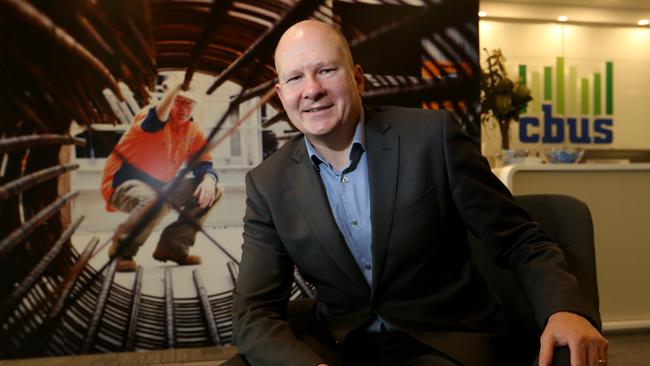
11.07am: What’s impressing analysts?
IGO: Raised to Lighten at Ord Minnett
Santos: Cut to Neutral at Credit Suisse; PT A$6.40
NIB Holdings: Cut to Hold at Morningstar
Sandfire upgraded to Outperform at Macquarie
Domino’s Pizza upgraded to Neutral at UBS; upgraded to add at Morgans
11.02am: SG Fleet brushes off tie-up speculation
SG Fleet has not responded to reports in The Australian concerning a potential tie-up of itself and the privately held LeasePlan, in a deal being worked on by Goldman Sachs and Bank of America.
“SG Fleet shareholders, which from time to time has included a review of potential industry consolidation opportunities and discussions with potential partners,” it said.
“Any discussions are preliminary in nature, and it remains highly uncertain whether SG Fleet’s ongoing evaluation of potential opportunities and related discussions will result in any specific outcome.”
Patrick Commins 11.00am: Good news for Economics 101 fans!
RBA boss Phil Lowe has just said - in parliament, no less, so it’s official - that the “basic laws of supply and demand work”.
Phew.
No word yet on gravity. Stay posted.
Patrick Commins 10.46am: No rate rise for 3 years: Lowe
RBA Governor Philip Lowe has told a parliamentary committee hearing rates are unlikely to rise for three years.
He told MPs “we’ve got to get back to unemployment at 4-point-something to get the type of wage pressure that will deliver inflation outcomes consistent with 2.5 per cent”.
Remembering he just said the jobless measure will still be at 6 per cent in two years’ time, in Dr Lowe’s words: “That still seems a long way away, doesn’t it?”.
“We will not be adjusting rates until we are confident inflation will be back solidly between 2 and 3 per cent - that’s why we are confident rates are unlikely to go up for three years.”
“Things would have to turn up very positively on the upside to get back there any time soon,” Dr Lowe said.
10.30am: Sharemarket higher after Wall St records
The local sharemarket has opened higher, with the ASX200 up 24 points or 0.37 per cent to around 6613 points.
It came after the S&P500 and Nasdaq indexes both hit record highs overnight and the pan-European STOXX 600 index rose 0.7 per cent.
Locally, the materials index is leading the way, up 1.63 per cent on the back of good economic news from balance of payments data and the RBA.
The health index was up 0.8 per cent while the tech index was up 0.74 per cent but the energy index slid 0.87 per cent as OPEC+ continues to struggle to reach a production consensus and oil prices slid further, down 0.96 per cent to $US47.42 a barrel.
Mesoblast was up 11.38 per cent after it confirmed it had received FDA permission to fast-track the approval of its remestemcel-L treatment for the respiratory impacts of COVID-19.
Sandfire Resources continued to rally, up 7.90 per cent, as the copper spot price on the London Metals Exchange reached new seven year highs of $7569.25 overnight.
Gold miners also rallied as the gold price increased back above the $US1800/oz mark, trading at $1812.34/oz when the market opened.
Worley was underperforming, down 3.38 per cent, while litigation funder Omni Bridgeway was down 1.64 per cent as the Senate prepares to vote on a disallowance motion on regulations that require such companies to register as managed investment schemes.
Beach Energy was down 1.13 per cent while Ansell and AMPOL were both down 0.97 per cent.
Patrick Commins 10.25am: Economy has ‘turned the corner’
RBA boss Philip Lowe is testifying in parliament and has delivered his opening statement, saying “this year has been an extremely difficult one for many people and businesses. But we have now turned the corner and a recovery is underway”.
Dr Lowe pointed to a bunch of good economic news, including that “over recent months, the number of people with a job has risen significantly”.
That means the unemployment rate will peak between 7 per cent and 8 per cent, rather than close to 10 per cent as earlier forecast.
Ahead of national accounts figures at 11:30am, he said “we are now expecting GDP growth to be solidly positive in both the September and December quarters”, before growth jumps to 4 per cent in 2021 and 5 per cent in 2022.
But: “These figures, though, cannot hide the reality that the recovery will be uneven and bumpy and that it will be drawn out.
“Some parts of the economy are doing quite well, but others are in considerable difficulty.
“And even with the overall economy now growing solidly, it will not be until the end of 2021 that we again reach the level of output recorded at the end of 2019.”
Unemployment will still be above 6 per cent in two years’ time, wage growth will be below 2 per cent in each of the next two years. That will cap inflation at 1 per cent next year and 1.5 per cent in 2022.
“It is certainly possible that the economy will do better than our central scenario,” Dr Lowe said. A vaccine could be widely available before the end of next year, and international travel could be loosened sooner as a result.
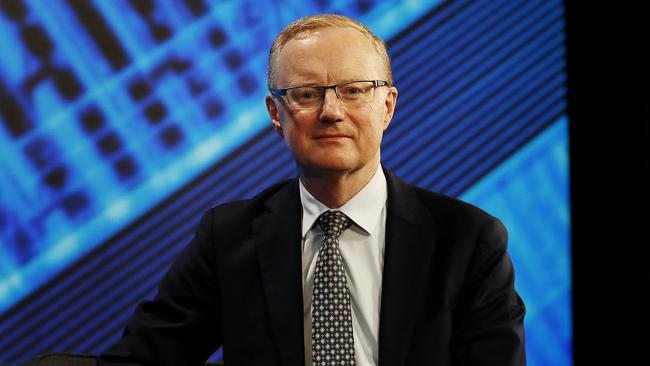
10.17am: RBA’s Lowe hails recovery but warns it’ll be bumpy
RBA Governor Dr Phillip Lowe has set out a rosier view for the Australian than was once feared, in an appearance before the House Standing Committee on Economics.
Dr Lowe said government and RBA action has cushioned the economic shock of the COVID-19 crisis.
“The peak in the unemployment rate is likely to be between 7 and 8 per cent, rather than 10 per cent,” he said.
“We’re now expecting GDP growth to be solidly positive in both the September and December quarters, and then next year our central scenario is that the economy will grow by 5 per cent, and then 4 per cent in 2022.”
However, Dr Lowe said the economic recovery would be “bumpy and “uneven” with output not returning to 2019 levels until the end of 2021 or later and wage increases remaining in the doldrums with the inflation level.
Dr Lowe has reiterated that the cash rate of 0.10 per cent will not be lifted until there is actual proof of inflation reaching the 2-3 per cent over the medium target, not merely a forecast.
He also said quantitative easing, combined with the government’s fiscal stimulus “has preserved hundreds of thousands of jobs”, while lower interest rates will support asset prices and boost balance sheets.
But the suggestion of a negative interest rate was again shot down, with Dr Lowe saying such a possibility was “unlikely” as the benefits do not outweigh the cost.
10.10am: Westpac sells insurance business to Allianz
Westpac will sell its general insurance business to Allianz and enter an exclusive 20-year agreement for the distribution of general insurance products to Westpac customers.
The sale price of Westpac General Insurance Limited and Westpac General Insurance Services Limited is $725m, representing a 1.3x multiple on gross written premium for the last financial year.
“ he sale of our General Insurance business adds around 12 bps to Westpac’s common equity Tier 1 capital ratio,” Westpac said in a statement to the ASX.
Completion of the transaction is subject to various regulatory approvals and is expected to occur in the second half.
10.00am: Zip transactions soar
Buy now pay later provider Zip Co has posted record transaction volumes in November of $577.1m, up 44 per cent on October and more than 100 per cent higher year-on-year.
Annualised transactions are now around $7bn while customers increased to 5.3m, with 464,000 new users in November.
Zip’s US brand Quadpay saw a transaction volume of $264.2m, up 65 per cent on October, and finished the month number 16 in the shopping category in the US app store.
Transactions in Australia and New Zealand increased 30 per cent on October to $312.9m.
Managing director and CEO Larry Diamond said the platform was close to doubling its annualised transaction volume.
“ZIP finished FY20 on $3.2bn in transaction volume (on a pro forma basis) and already by November, we are run-rating at approximately $7bn,” he said.
9.45am: ASX under scrutiny after outage
The Council of Financial Regulators, which counts APRA, ASIC, the RBA and the Treasury as its members, says it is keeping an eye on the functioning of the ASX following its outage on November 16 and continuing difficulties with its options trading service.
“The council discussed the significant operational outages experienced by the Australian Securities Exchange (ASX) in recent weeks,” the council said in a statement, after a meeting a meeting last week.
“Members expressed concern about the potential impact of the outages on market functioning and investor confidence.
“The council noted that Chi-X’s trading facilities were operational throughout the outages of ASX systems in the week of November 16.
“The Australian Securities and Investments Commission (ASIC) and the Reserve Bank have been in close contact with ASX during this period and will also be closely involved in ASX’s review processes.”
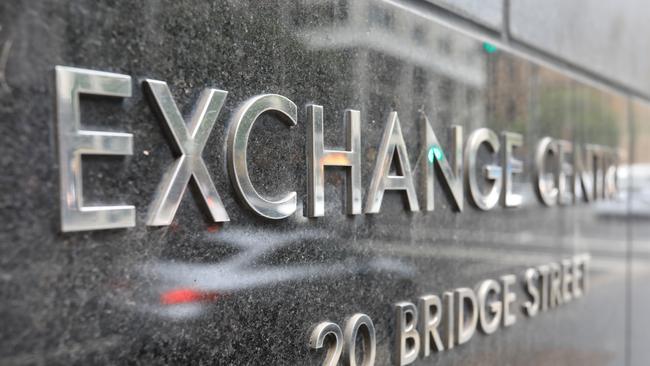
9.40am: Mesoblast treatment fast-tracked
Mesoblast has received a “fast track designation” by the US Food and Drugs administration for its remestemcel-L treatment for the respiratory impacts of COVID-19.
Fast track designation allows the development and expedite review of therapies to treat serious and life-threatening conditions with no or limited treatment options.
Clinical trials of Mesoblast’s drug have shown promise and the company’s share price has jumped by more than 25 per cent in two weeks. It last traded at $4.13 a share.
9.15am: Crown fills compliance, financial crimes role
Casino operator Crown Resorts, which is facing scrutiny from regulators due to money-laundering concerns, said it will appoint a bank executive to the newly created role of chief compliance and financial crimes officer.
Crown said Steven Blackburn will start in March in the new role and will lead Crown’s new compliance and financial crimes department. Mr. Blackburn currently works at National Australia Bank in a similar role.
“This appointment is a further significant step forward in strengthening our compliance and anti-money laundering functions,” said Crown Chief Executive Ken Barton.
In November, the casino regulator in New South Wales state said that Crown won’t be able to start operating gaming facilities at a new Sydney casino until a probe into its suitability to hold a license is completed early next year.
Crown told the regulator in September that it was recruiting for the new financial crimes role.
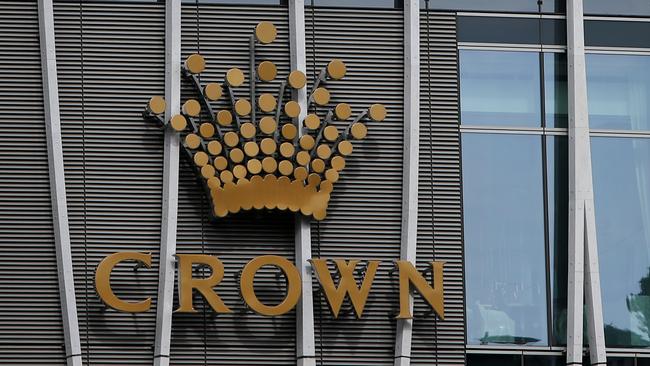
Dow Jones Newswires
8.59am: Downer sells 70pc of Spotless
Downer EDI has managed to offload most of its Spotless laundry business after multiple attempts, selling a 70 per cent interest to private equity firm Adamantem Capital for $155m.
The remaining 30 per cent interest will be recognised as an equity accounted investment.
The sale is expected to be completed by March 2021, subject to regulatory and customer approvals.
8.53am: Village to fight $11m tax bill
Village Roadshow has been hit with an $11m tax bill following a four-year long ATO audit of the entertainment company.
As well as having to pay that amount, the company told the market “it is anticipated that the ATO will also issue penalty notices in relation to the underlying issue.”
However, Village Roadshow says it will contest the tax assessments and penalty notices while pursuing payment deferral “on the basis that the ATO position is not supported by precedent.”
8.38am: Laybuy purchases soar
Listed New Zealand buy now pay later company Laybuy says purchases on its platform jumped 56 per cent from October to November, reaching $NZ71m ($68m) to exceed half year forecasts.
Purchases made using the platform increased 33 per cent in Australia and New Zealand and 79 per cent in the UK, said managing director Gary Rohloff, who added that the second COVID-19 lockdown in the UK boosted sales.
Additionally, 79,300 new customers joined the platform in the past eight weeks, a growth rate of 19 per cent.
Joyce Moullakis 8.30am: RBS’s Matheson to be NAB operating chief
National Australia Bank chief executive Ross McEwan has tapped former Royal Bank of Scotland colleague Les Matheson as operating boss, rounding out his executive front bench.
The Australian flagged in June that Mr Matheson was a frontrunner to secure a key executive role at NAB, given his desire to return to Australia.
In an ASX statement on Wednesday, NAB said he was appointed chief operating officer, with responsibility for digital arm UBank, group marketing, corporate affairs and other strategic initiatives.
Most recently Mr Matheson was head of personal and business banking at RBS, where he finished up in September. He has also held senior executive banking roles in the United Kingdom and Asia Pacific during more than two decades in banking, including Citigroup’s Australia country officer for Australia and domestic retail chief.
“Les is a globally experienced banker and I am very pleased he is joining NAB,” Mr McEwan said. “During our time working together in the UK, he demonstrated his deep knowledge of what it means to really deliver for customers and colleagues. This experience and the strong leadership Les brings will be important as we look to grow our bank safely and earn the trust and respect of customers and the broader community.
“His appointment completes my executive leadership team.”
Mr Matheson said: “I’m very pleased to be returning to Australia and joining NAB. This is a terrific opportunity to work with Ross and his team to deliver on NAB’s refreshed strategy and ambition to serve customers well and help our communities prosper. That’s what good banks should do.”
Mr Matheson joins NAB on January 11, subject to regulatory approvals.
8.26am: Salesforce to buy Slack for $US27.7bn
Salesforce.com agreed to buy workplace-collaboration software pioneer Slack Technologies for $US27.7 billion in a deal that would turn the combined company into one of the biggest players in the competitive business-software market.
Salesforce said it would acquire Slack in a cash and stock transaction. The Wall Street Journal previously reported the companies were in advanced deal talks.
The purchase, which still has to clear Slack shareholder and regulatory approval, would be Salesforce’s largest ever acquisition. It also would underpin Chief Executive Marc Benioff’s effort to move the company he co-founded 21 years ago beyond its core customer-relationship-management software to providing the software tools that businesses need for a swath of their day-to-day operations.
The deal also opens a new front in Salesforce’s battle with much larger rival Microsoft Corp., which has been pushing to be the go-to software vendor for businesses, offering a range of applications from data storage to video communications. The Redmond, Wash.-based company introduced its Teams software suite in 2016 with Slack-like chat collaboration features.
Dow Jones
7.05am: Stocks set for a positive start
Australian stocks are set to open higher as Wall Street extended its November rally into a new month, aided by optimism over the rollout of coronavirus vaccines in Europe.
Around 8am (AEDT) the SPI futures index was up 37 points, or 0.6 per cent.
Yesterday, Australian stocks closed 1.1 per cent higher after promising economic figures, and the RBA left rates on hold.
The Australian dollar is higher at US73.65c.
Iron ore rose 0.6 per cent to a new six-year high of $US133.05 a tonne, according to CommSec.
Brent oil fell 1.0 per cent to $US47.42 a barrel.
8.07am: S&P 500, Nasdaq hit new records
US stocks rose, giving the S&P 500 and Nasdaq Composite Index fresh records, as the optimism behind the November market rally extended into a new month.
The broad S&P index gained 1.1 per cent, while the tech-heavy Nasdaq added 1.3 per cent, both hitting closing records as of the close of trade. The Dow Jones Industrial Average advanced 0.6 per cent, or about 185 points, to 29824, after Monday closing out its best month since 1987.
Despite the tumult of 2020, the S&P 500 is up 13 per cent for the year, while the surge in technology shares has helped the Nasdaq soar 38 per cent.
Investors’ sentiment has been buoyed in recent weeks by promising reports on the development of COVID-19 vaccines, which could curtail infection levels and let social and business activity return to pre-pandemic levels.
“That news was so much more positive than I think people expected,” said Elliott Savage, portfolio manager of YCG Enhanced Fund. “To have two come out that were 90pc and 95pc effective, I think that just was a very big change in expectations for how quickly the economy can get back to quote-unquote normal.”
Pfizer partner BioNTech and U.S. drugmaker Moderna have applied for their coronavirus vaccines to be approved in the European Union, the EU’s chief medicines regulator said Tuesday.
In another potential positive for the markets, on Tuesday negotiations in Washington over additional coronavirus relief showed signs of resuming. Investors have closely followed developments that could lead to more economic stimulus.
Overseas, the pan-continental Stoxx Europe 600 rose 0.7 per cent. Surveys on manufacturing activity in many major European economies on Tuesday showed a broad continued expansion in the eurozone.
Dow Jones Newswires
6.20am: Coronavirus stimulus talks restart
Stalled US negotiations over coronavirus relief showed signs of new life, as a bipartisan group of lawmakers unveiled a compromise proposal and the issue was set to resurface in talks between top Democratic and White House negotiators.
House Speaker Nancy Pelosi and Treasury Secretary Steven Mnuchin planned to speak today (AEDT) on government funding, which runs out next week, and were expected to address COVID-19 relief as well.
Meanwhile, after a month of discussions, a group of lawmakers from both the House and Senate unveiled a $US908 billion aid proposal, seeking a middle ground between Democratic and Republican leaders’ stances.
Dow Jones
5.20am: Biden calls on Congress to pass ‘robust’ relief plan
President-elect Joe Biden called on Congress to quickly approve a “robust” aid plan to address the COVID-19 economic crisis, which his pick to lead the US Treasury called a “tragedy” for American families.
As he presented his economic team, including former Federal Reserve chief Janet Yellen as Treasury secretary, Biden said his administration will push for even more measures to right the economy reeling from the damage wrought by the coronavirus pandemic.
“I know times are tough, but I want you to know that help is on the way,” Biden said at the event.
Yellen said later that the world’s largest economy was facing a “historic” crisis hitting the most vulnerable the hardest.
She warned that inaction would lead to a further downturn, “causing yet more devastation.” “So many people struggling to put food on the table and pay bills and rent. It’s an American tragedy,” Yellen said at the event in Wilmington, Delaware.
The US Congress has been deadlocked on new aid legislation, with Democratic and Republican leaders far apart on which type and how much assistance to provide.
Economists have warned of the need for further stimulus as the country faces difficult months ahead before vaccines become available to the wider public.
Biden is due to be sworn in on January 20.
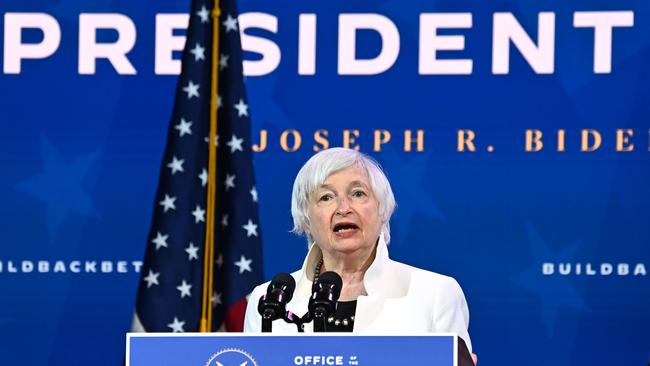
AFP
6.00am: Gold bounces back
Gold futures climbed, bouncing back from the five-month low it settled at a day earlier, as the U.S. dollar fell sharply, boosting the appeal of the precious metal, which is traded in the greenback.
February gold rose $US38, or 2.1pc, to settle at $US1818.90 an ounce. That was the largest one-day dollar and percentage gain for a most-active contract since November 5, according to FactSet data.
On Monday prices settled at $US1780.90, the lowest settlement since July 1.
Dow Jones
5.55am: IPO could value Airbnb at $US35bn
Airbnb said it plans to sell 50 million shares in an initial public offering that could give the home-rental company a valuation of as much as $US35 billion.
The San Francisco startup said it expects an offering price of between $US44 and $US50 a share, adding that a pricing at the $US47 midpoint of that range would yield net proceeds of about $US2.3 billion, or roughly $US2.5 billion if the underwriters exercise an option to buy an additional 3.5 million shares.
Airbnb said co-founders Brian Chesky, Joe Gebbia and Nathan Blecharczyk are selling about 1.9 million shares in the offering, bringing the total size of the IPO to 51.9 million shares. The trio, who launched the startup in 2008, will still hold nearly 43 per cent of Airbnb’s voting power after the offering, according to a filing with the U.S. Securities and Exchange Commission.
Airbnb said it would have roughly 601.4 million shares outstanding after the IPO, assuming exercise of the overallotment option, for a valuation topping $US30 billion at the $US50 high end of the expected pricing range. On a fully diluted basis, including stock options, restricted stock units and proceeds from the offering, that figure rises to about $US34.8 billion.
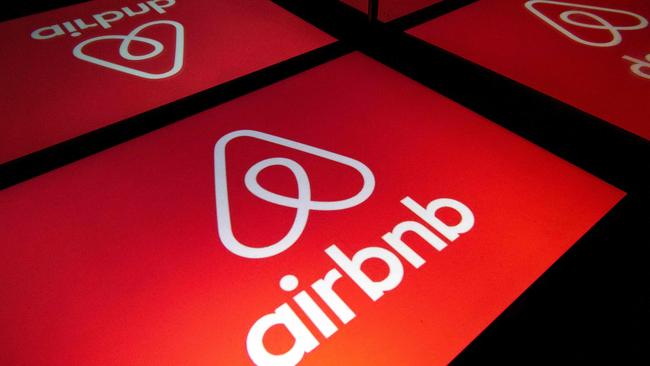
Dow Jones
Patrick Commins 5.51am: OECD forecasts bright future for Australia
The OECD has sharply upgraded its growth forecasts for Australia and declared there is “hope for a brighter future”, ahead of Wednesday’s national accounts figures, which will confirm the country roared out of the COVID-19 recession over the three months to September.
Scott Morrison said Australia was now “opening safely” in time to meet his Christmas deadline as Queensland dropped restrictions with NSW and Victoria, and Western Australia flagging that it would move next week to drop its travel restrictions with the nation’s two largest states.
“A very important milestone has been reached in this comeback from the COVID-19 recession. Today is the day when the borders are tumbling down,” the Prime Minister said.
Mr Morrison argued the easing of hard borders, restoration of lost jobs and hours, and the graduation of more than two million Australians from JobKeeper payments in October demonstrated that “the comeback is on”, while Josh Frydenberg said the economy was “coming back from the biggest hit in over a century”.
Economists were predicting on Tuesday that the economy grew by between 2.8 per cent and 4 per cent during the September quarter, as a string of new data suggested the recovery had extended into the final months of the year.
5.10am: Stocks rise, S&P 500 on course for new record
US stocks rose, putting the S&P 500 on course for a fresh record, as the optimism behind the November market rally extended into a new month.
In early afternoon (US) trade, the broad US index gained 1.3 per cent, and the tech-heavy Nasdaq Composite added 1.4 per cent, also on pace for a record. The Dow Jones Industrial Average advanced 0.9 per cent, after on Monday closing out its best month since 1987.
Despite the tumult of 2020, the S&P 500 is up 13 per cent for the year, while the surge in technology shares has helped the Nasdaq soar 37 per cent.
Investors’ sentiment has been buoyed in recent weeks by the development of COVID-19 vaccines, which could curtail infection levels and let social and business activity return to pre-pandemic levels.
Pfizer partner BioNTech and US drugmaker Moderna have applied for their coronavirus vaccines to be approved in the European Union, the EU’s chief medicines regulator said.
“The mood of the market is rather optimistic,” said Eric Barthalon, global head of capital markets research at Allianz. “For the time being, markets have bought the news that vaccines are going to be rolled out earlier than expected.”
Policy makers such as Federal Reserve Chairman Jerome Powell are paying more attention to potential hurdles in widespread distribution of the vaccines, and other challenges before the economy returns to normal, Mr. Barthalon said.
Mr Powell, in testimony prepared for delivery at a congressional hearing Tuesday, said the Fed’s actions to backstop credit markets this past spring had unlocked almost $US2 trillion to support businesses, cities and states. Investors are likely to be watching for further insights into the pace and strength of the economic recovery when he takes questions from lawmakers. Treasury Secretary Steven Mnuchin is also expected to testify.
Among individual stocks, Tesla shares rose 4 per cent after S&P Dow Jones Indices said it would add the car maker’s full weight to the S&P 500 in one move. Shares in Zoom Video Communications dropped 11 per cent. The videoconferencing company on Monday signalled that higher sales in recent months have come with higher costs, disappointing investors.
Overseas, the pan-continental Stoxx Europe 600 rose 0.8 per cent. Surveys on manufacturing activity in many major European economies on Tuesday showed a broad continued expansion in the eurozone.
In Asia, most major benchmarks rose by the close of trading. The Shanghai Composite Index added 1.8 per cent, Hong Kong’s Hang Seng advanced 0.9 per cent and Japan’s Nikkei 225 climbed 1.3 per cent.
A private gauge of manufacturing activity in China hit its highest level in a decade in November, signalling a strong recovery in the world’s second-largest economy.
Dow Jones Newswires
5.10am: Nasdaq proposes board-diversity rule
Nasdaq aims to require listed companies to include women and people of diverse racial identities or sexual orientation on their boards, a move that could prompt change at hundreds of companies.
The exchange operator filed a proposal with the Securities and Exchange Commission that would require listed companies to have at least one woman on their boards, in addition to a director from an under-represented minority or one who is lesbian, gay, bisexual or transgender. Companies that don’t meet the standard would be required to explain why not.
The plan is Wall Street’s latest effort to diversify the heavily white and male boardrooms of corporate America. But it could have more impact than previous attempts because of Nasdaq’s ability to set rules for the more than 3000 companies listed on its stock exchange. Potentially, companies that fail to meet the requirements could be delisted.
In a review carried out over the past six months, Nasdaq found that more than three-quarters of its listed companies would have fallen short of the proposed requirements. A supermajority of companies had at least one female director, but most didn’t have a second board member that would meet the diversity requirements. The exchange operator said it was difficult to measure precisely because of inconsistencies in the way companies report such data.
The review found smaller companies tended to have less diverse boards and would need to do more to respond to the proposed rule, said Nelson Griggs, an executive vice president at Nasdaq who leads its listing business. “With smaller issuers, there will be greater impact,” he said in an interview.
Foreign companies and smaller companies could meet the requirement with two female directors, Nasdaq said.

Dow Jones
5.05am: Stocks rally on economic recovery hopes
Markets rallied on economic recovery hopes based on upbeat Chinese data and expectations of Covid vaccinations by 2021, though surging virus infections kept traders in check.
The US dollar traded for more than 1.2 per euro, a level last seen in May 2018, as investors opted for assets that entailed more risk.
Bitcoin fell back from its record-high close to $US20,000 on Monday. Oil prices retreated as members of the OPEC oil producers cartel delayed until Thursday talks with allies over a possible extension to output cuts to support the pandemic-stricken market.
“That good feeling is back in the markets,” said Craig Erlam, senior market analyst at OANDA Europe.
And Chris Beauchamp, chief market analyst at IG, said: “December has started on the front foot, with solid gains across the board for stock markets... as investors took heart from the China PMI numbers that showed there was a solid recovery in play in the world’s manufacturing heart.”
November saw New York’s Dow index enjoy its best month in almost 34 years -- after better-than-expected results from several coronavirus drugs and hopes they will begin to be rolled out before the end of the year.
London’s benchmark FTSE 100 index was up by 1.9 per cent when the closing bell rang. Frankfurt rose 0.7 per cent and Paris added 1.1 per cent.
The Dow showed a gain of 0.9 per cent in midday New York trading. Analysts said the prospect that millions of people will soon start getting a jab will allow traders to bet on a strong recovery in the world economy next year.
The European Medicines Agency said it would hold an extraordinary meeting on December 29 “at the latest” to consider emergency approval for a COVID-19 vaccine developed by Germany’s BioNTech and US giant Pfizer.
Meanwhile the global economy might get back to pre-pandemic levels by the end of next year as vaccines help propel recovery, but growth is likely to be uneven, said the OECD.
Activity in China’s factories expanded at its fastest pace in a decade last month, data has showed, the latest sign that the world’s second-biggest economy is well on track to recovery from the coronavirus.
AFP
5.00am: Virus hampers US manufacturing growth
The US manufacturing sector continued to grow in November but the coronavirus pandemic was still exacting a toll, particularly on employment, a survey said.
The Institute for Supply Management’s (ISM) manufacturing index was at 57.5 per cent last month, slightly worse than expected but still above the 50-percent threshold indicating growth.
The report marked the seventh consecutive month of growth since the index contracted sharply in the early days of the pandemic, but November’s report shows key indicators slowing as the United States weathers the world’s largest COVID-19 outbreak.
AFP
4.58am: Pfizer, Moderna request vaccine tick in Europe
Pfizer partner BioNTech and US drugmaker Moderna both applied for their coronavirus vaccines to be approved in the European Union, the EU’s chief medicines regulator, with officials expected to make a decision on at least one of the vaccines by the end of the month.
The announcement brings hope that the EU will soon be able to start vaccinating its 448 million people against a disease that has done some of its earliest and worst damage on the continent, in places like northern Italy, Belgium and France.
The European Medicines Agency said its officials will work through Christmas to review whether data from trials show sufficient proof of the two vaccines’ safety and effectiveness. If so, the vaccines could be marketed as soon as this month, according to people familiar with the discussions. The EMA is set to make a judgment on the BioNTech vaccine first, by December 29 at the latest, giving that candidate a two-week edge in the vaccine race over Moderna’s candidate. The agency will then decide whether to authorise the Moderna vaccine by January 12, officials said.
The submission marked a milestone in the race to supply the world with a working vaccine to end the pandemic, said Ugur Sahin, the chief executive of BioNTech.
Dow Jones
4.55am: Munich Re eyes return to pre-pandemic profits
German reinsurance giant Munich Re said it was aiming to return to its pre-pandemic profit targets in 2021, expecting to take a far smaller hit from coronavirus-related claims next year.
“The burdens arising from COVID-19 are financially manageable for Munich Re,” finance chief Christoph Jurecka said in a statement, despite the health crisis’s “considerable impact”.
The group said it should return to its pre-pandemic net profit level of 2.8 billion euros ($US3.35 billion) in 2021, as it expects coronavirus burdens to be “on a considerably smaller scale” than in 2020.
Compared with expected reinsurance losses of 3.4 billion euros arising from COVID-19 in 2020, virus-induced claims next year are forecast to amount to 500 million euros.
Without the coronavirus, Munich Re would have been able to achieve its original targets for 2020, Jurecka said.
4.52am: Eurozone inflation stuck in negative
Eurozone inflation remained in negative territory for the fourth consecutive month, official data said, with the European economy impaired by the second wave of the coronavirus.
The EU’s Eurostat data agency said inflation remained at -0.3 per cent in November, way off the official target set by the European Central Bank of just under two per cent.
The descent into deflationary territory has put pressure on the ECB to draw up further stimulus measures, already at 1.35 trillion euros ($US1.58 trillion), and should encourage governments to spend more.
Europe’s economy is heading back into recession in the fourth quarter, after a short recovery over the summer failed to take hold as coronavirus cases shot back higher.
AFP
4.50am: OPEC delays talks with allies
The members of the OPEC oil producers cartel decided to delay by two days talks with their allies over a possible extension to output cuts to support the pandemic-stricken market.
An OPEC source said while the 13 members of OPEC proper may continue informal discussions on Tuesday, no formal ministerial conference along the lines of that on Monday was planned.
The organisation confirmed that the meeting of the broader OPEC+ grouping -- which includes Russia -- had been delayed to Thursday night (AEDT).
Cartel members had failed to reach agreement on Monday after around four hours of videoconference talks.
Despite expectations before the meeting that an extension of output cuts was on the cards, analysts have taken the delay as a sign of splits within the grouping.
Some members are still of the opinion that as the second wave of the coronavirus pandemic continues to rage in many countries it would be premature to introduce almost two million additional barrels per day onto the market, as envisioned in the deal struck in April by OPEC and its partners.
However, the recent rise in crude oil prices -- which have picked up by 25 per cent over the past month -- as well as positive news on vaccine development means others see light at the end of the tunnel and are arguing for keeping to the current calendar.
After falling a little on Monday evening after talks broke up without agreement, the prices for both the US crude oil benchmark, West Texas Intermediate (WTI), and Europe’s Brent North Sea contracts were stable.
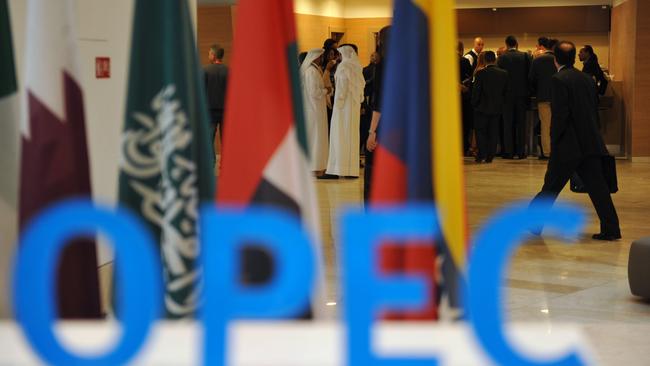
AFP
4.45am: Collapse of UK retailers threaten 25,000 jobs
Debenhams and Topshop-owner Arcadia, two of Britain’s biggest clothing retailers, stood on the brink of collapse following coronavirus fallout and fierce online competition, risking the loss of 25,000 jobs.
British department store chain Debenhams said it was set to close for business save for an unlikely rescue, meaning around 12,000 jobs were set to go.
The business, which had been struggling long before the pandemic, made its announcement after British clothing retailer Arcadia fell into administration late Monday, putting at risk a further 13,000 roles.
The news comes on the eve of England exiting a second lockdown which has battered in particular the nation’s retail and hospitality sectors.
Debenhams, whose history dates back to the late eighteenth century, said in a statement that it would continue to trade through its 124 UK stores and online to clear stock.
“On conclusion of this process, if no alternative offers have been received, the UK operations will close,” it added.
Debenhams, which has already been shedding thousands of jobs ahead of and during the pandemic, currently employs around 12,000 staff -- mostly being paid by the government under its Covid furlough scheme.
“All reasonable steps were taken to complete a transaction that would secure the future of Debenhams,” said Geoff Rowley, one of the administrators acting on behalf of the group.
“However, the economic landscape is extremely challenging and, coupled with the uncertainty facing the UK retail industry, a viable deal could not be reached.”
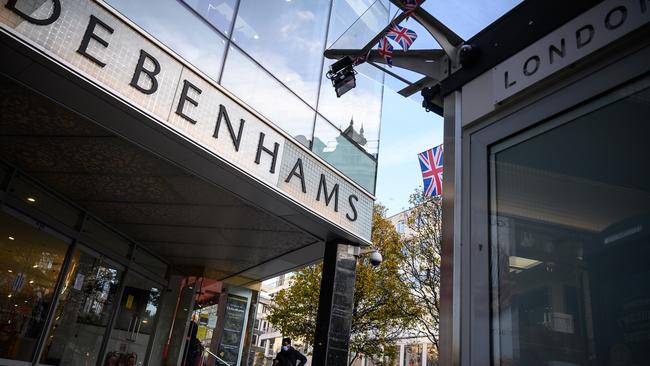
Debenhams collapse comes as the future of Arcadia hangs by a thread. Arcadia blamed its tumbling into administration largely on coronavirus fallout, but it too has struggled to adapt from a bricks-and-mortar business into an leading online company.
Its failure has meanwhile been queried by senior government minister Michael Gove.
“The Arcadia story is a tragic one, I’m not going to criticise any individual but there’s been a lot of reporting that points out some of the missteps by the management there,” the key ally of Prime Minister Boris Johnson told Sky News on Tuesday.
“We know more broadly, to be fair, that the high street is facing unprecedented pressure, significant part of that of course is Covid.” Arcadia owner Philip Green -- once dubbed “the king of the high street” -- already saw his reputation severely hit by the high-profile collapse of UK retailer BHS four years ago.
Having sold it for just £1 to Dominic Chappell, a former bankrupt businessman with no retail experience, BHS then collapsed one year later, resulting in 11,000 job losses and leaving a massive deficit in its pension fund.
AFP
4.40am: World economy back to pre-pandemic level in 2021: OECD
The global economy may get back to pre-pandemic levels by the end of next year as vaccines help propel recovery, but growth is likely to be uneven, the OECD said.
Releasing its latest forecasts, the Organisation for Economic Co-operation and Development now sees world output dropping by 4.2 per cent but then snapping back with 4.2 per cent growth in 2021.
AFP



To join the conversation, please log in. Don't have an account? Register
Join the conversation, you are commenting as Logout